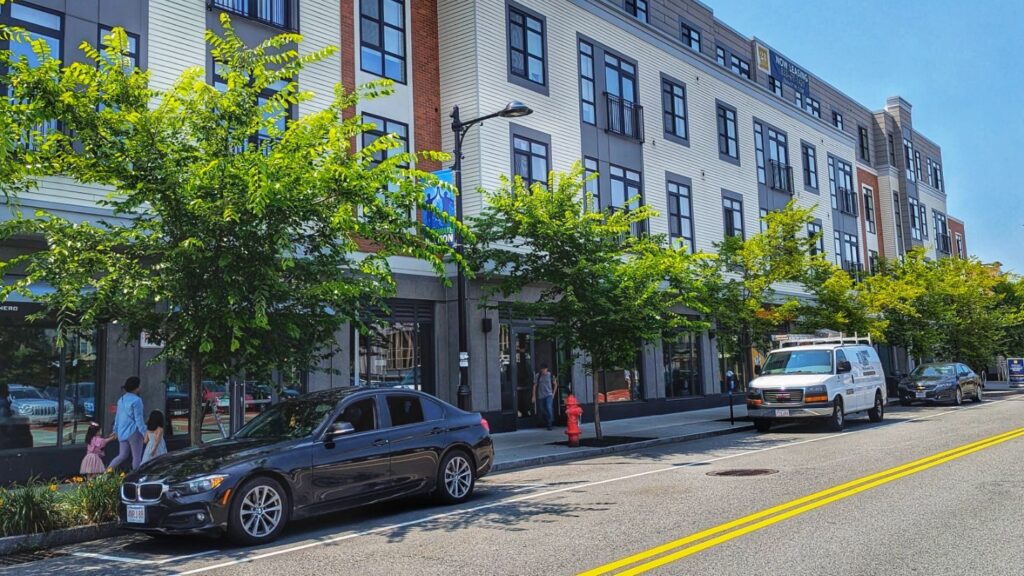If Alex Jablon, financial auditor and candidate for state representative, could have dinner with one person from history, he’d pick his grandmother and he’d serve his dad’s chicken kabob recipe.
“I’d ask the questions I didn’t get the chance to ask while she was alive, let her know how I’m doing,” Jablon said. “Family is everything to me.”
His opponent, former Newton City Councilor Amy Sangiolo, would have dinner with her mother.
“My mother was a Japanese immigrant who came to the United States. When my father died, I learned that she was 10 years older, that she had been previously married, that she came over as a Japanese war bride married to an African American Army sergeant, and I knew nothing about this,” Sangiolo said. “And after my father died, my mother had pretty bad dementia, and I couldn’t learn anything about her story, and I’m trying to learn about the story, because I want to know what struggles or what wonderful memories we had of that era.”
Sangiolo added that she’d serve sukiyaki, her mother’s favorite dish.
That was just one topic in a debate Wednesday afternoon between the two candidates for the Democratic nomination for the 11th Middlesex state representative seat, hosted by the Charles River Regional Chamber and moderated by Chamber President Greg Reibman.
Legislature mess
Reibman started the debate off with a question about the “crisis” going on in the legislature as nine major bills—including a huge housing bill and an economic development bill—were stuck in committees and waiting to be voted on by the legislature’s midnight deadline.
When this happens, Reibman pointed out, lawmakers who aren’t in the relevant committees have to vote on bills they haven’t had a chance to read.
How would the candidates handle that if they were in the legislature already?
Jablon said he would need to be briefed and wouldn’t be comfortable voting on bills without knowing what’s in them.
“I’m an auditor. Rubber-stamping is the exact type of thing that got us into things like Enron, Arthur Anderson, Tyco and WorldCom,” Jablon said, also citing Puerto Rico’s debt crisis as a consequence of not reviewing legislation.
Sangiolo, a lawyer who works in the attorney general’s office, said it’s “very troubling” to not know what’s in bills before voting.
“I think that, to some extent, anybody who’s at the state legislature should know what bills are up there, what is being discussed,” she said. “I will read every single bill and try to understand all the last-minute issues that there are and bills and trade-offs that are being made in order to get the work done.”
Housing affordability
That aforementioned housing bill includes a number of measures to increase housing supply and stabilize the rental market.
Housing is the biggest policy issue the Charles River Regional Chamber focuses on these days—the lack of it, the skyrocketing costs of it and the zoning that keeps it elusive—and both Sangiolo and Jablon said the state needs to foster more affordable housing.
Sangiolo said she supports the housing bill that’s in the legislature but also said it’s missing a real estate transfer tax option for communities to make money off of real estate sales that can be used to build and maintain more affordable housing.
“I would like to see more public sector, more government-funded housing stock, which I was a proponent of when I was on the City Council,” she said.
Jablon agreed about the real estate transfer tax and said he would also look at converting unused buildings into housing.
“We are going through a bit of a revolution right now with malls,” he said. “Back in the ‘80s, they were a big deal, but right now they’re not doing so hot for the most part.”
Jablon pointed out the Atrium Mall, which was converted to a fitness complex and offices, and he said more underused spaces can be repurposed into housing.
Jablon also wants to limit the role of private equity in the housing market.
“We’ve seen BlackRock become the biggest landlord in the country, and they haven’t been a very good one,” Jablon said. “They’re buying up all of our housing and basically exploiting people, jacking up rents.”

Electrification and climate change
Newton is moving forward with an ordinance requiring all new construction and substantial renovations be set up with electric, not fossil fuel energy. There are 10 communities approved for this so far, but many are pushing for the electrification mandate to go statewide.
And the city is looking at creating a BERDO—which stands for Building Emissions Reduction and Disclosure Ordinance—a locally imposed mandate for buildings to report energy use and emissions and also reduce emissions. Boston has a BERDO in place already. So does Cambridge.
These environmental regulation changes have some developers and business owners pushing back due to cost.
Jablon said the government should help with resources and guidance during the transition but emphasized that he thinks the electrification has to be done.
“There is a big cost associated with electrification. But you know what’s a bigger cost? If we don’t do it and then we have our water lines come up and take away our shoreline here in Boston, then you don’t have any space whatsoever,” he said. “So there is a much bigger cost to doing nothing than there is to doing something.”
Sangiolo said the state and local governments need to collaborate with businesses but the transition needs to be done to get to the state’s carbon reduction goals by 2050.
“It’s an existential crisis that we’re facing, so we all have to put in whatever we can to save our planet,” Sangiolo said. “I testified at the hearing last month on BERDO, right? And I’ve heard what business owners, your Chamber members, have said. And I took that to heart.”

Small business support
Reibman asked the candidates what they would do to help small businesses thrive in Massachusetts.
Sangiolo said she’d work to build a support network for small businesses called a “hive.”
“What I’m envisioning is a centralized system through the state that can also be used by different towns and municipalities that have the resources that everyone needs,” she explained. “Streamlining the permitting process, making sure that businesses understand what new regulations have been approved and that they have to comply with, making sure that they have access to legal counsel, because sometimes they need that in order to get licenses and permits.”
Jablon, whose parents are small business owners, said he wants the state to have “a more robust kind of micro-loan system.”
“We’ve seen in the past when that’s been implemented in other places has been really good for small businesses, especially ones that have short term struggles,” Jablon said.
Jablon added that upgrading infrastructure and adding mixed-use developments can bring businesses more customers and more revenue.
“Look at Newtonville and look at Austin Street, having Cafe Nero and things there, and all the benches that have just been put in,” he said. “And Newtonville is buzzing. I grew up in Newtonville, and it’s buzzing in ways that I haven’t seen when I was a kid. People are there all the time. It’s great.”
The Democratic primary will be held on Sept. 3.
Below is the video of the debate, provided by the Chamber.